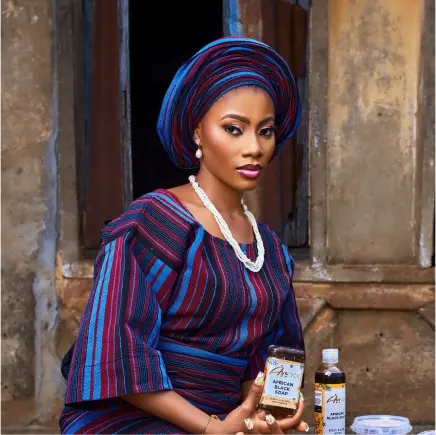Frequently Asked Questions
African black soap is a unique all-natural soap that is made from plant-based ingredients such as plantain and cassava skins, cocoa pods, and palm kernel oil. It was created centuries ago in Yorubaland and has spread throughout West Africa. It is known all around the world for its deep cleansing and exfoliating properties and is for both skin and hair.
African black soap has several benefits that are almost immediately obvious to a first time user. Excellent for both skin and hair, African black soap will reduce the appearance of blemishes and dark spots, improving skin texture and tone, and even moisturizing dry skin. It is very effective in treating skin conditions like eczema, psoriasis, acne and hyperpigmentation.
There is a lot of misinformation about black soap. The original and most authentic type of African black soap is Nigerian black soap made in Yorubaland, SW Nigeria. Yourubaland is where black soap was first created many centuries ago before it was introduced to other West African countries. It is known as – Ose Dudu. Nigerian black soap has a very deep brown hue to it that is similar in colour to dark roast coffee or 100% cocoa dark chocolate. It is also the most expensive black soap and is of very high quality. It should be hard but soften and melts when exposed to air.
After this is the Ghanaian Black Soap or Alata Samina, which is a version of Nigerian black soap but with improvised ingredients which result in a chunky light brown coloured brittle product. It is less expensive than Nigerian black soap and it is a lot more available due to cheaper price. The light brown colour is how you know the difference. Ghana black soap is an affordable alternative to Nigerian black soap if you can find a reputable brand.
There is also the fake black soaps which are jet black or charcoal in colour. Any soap that is jet black or rock-hard and brittle, like a regular toilet soap, is fake. Premium black soap should be firm but slightly moldable.
Yes it is. While African black soap is generally considered to be suitable for all skin types, some people may experience dryness while using it. This is because the soap contains natural exfoliants. This is a good thing! To counter dryness, use natural oils like jojoba for the face and shea butter for the body and hair while still damp.
Some commercial African black soap products may contain synthetic fragrances or other additives that can cause skin irritation. You should avoid these brands and stick with all-natural brands like Ase African black soap.
African black soap is a good option for people with sensitive skin, as it is made from natural ingredients and does not contain harsh chemicals like regular soap. However, it is important to ease your skin into using African black soap by using it every other day for as little as 1 minute and gradually increasing the frequency and duration.
Yes, African black soap can be used on the face and body as a gentle cleanser. However, it is important to ease your skin gently into the use of black soap, especially if you have sensitive skin. Please see faq #10 below.
Some people experience dryness which is due to the highly effective natural exfoliants in African black soap. It’s a good thing! You should immediately use oils while your skin or hair is still damp. Please see faq #3
The short answer is no. African black soap is considered to be a gentle skin and hair cleanser that does not strip it of its natural oils. Authentically made African black soap does not contain bleaching agents however, it will even out your skin tone, fade dark spots and hyperpigmentation.
Yes it can! In fact, in ancient times in Yorubaland, where African black soap was created, it was used for the ceremonial first wash of a newly born infant. In modern times, you will need to be care full of the brand you pick and also consider what ingredients it contains. You want a 100% all-natural product like Ase African black soap.
To use African black soap, cut a sizable chunk and allow to soften by exposing it to air in a saucer. Wet your hands and the soap, then rub the soap between your hands to create a lather. Apply lather to face, body or hair. Leave on skin or hair for 1 – 3 minutes, then rinse off with water. Always lather on hand, sponge, loofah or washcloth. Don’t lather soap direct on skin. Use an emollient immediately after, while skin or hair is still damp. We suggest using a light non-comedogenic oil like jojoba oil for the face and a nutritious West African shea butter based products for hair and body.
Yes, African black soap can be used on the hair, as an alternative to commercial shampoos, to deep cleanse. You will be amazed just how clean your scalp and hair will feel after a wash using African black soap. You can go to our review page to see real reviews from actual long time customers. Always follow up with a conditioner to avoid drying.
The frequency of use depends on your skin type and individual needs. For best results, use African black soap daily but ensure you ease your skin into African black soap use slowly by using every other day.
African black soap has a distinct earthy or smoky scent due to the natural ingredients used to make it. Some brands add essential oils or fragrances to their soap to make it more appealing to users but these additions are not natural and can cause irritation to the skin.
Authentic small-batch brands like Ase African black soap do not contain chemicals. We use the original recipes, high quality ingredients and traditional processes to make one of the best African black soap products on the market today.
This is a very important question. African black soap can be found in many health food stores, natural beauty stores, and online retailers. It is imperative you find a trusted high-quality brand with a reputation, like Ase African black soap, in order to avoid brands that use hazardous preservatives and chemicals, poor quality ingredients and production techniques.
African black soap can be vegan if it is made from plant-based ingredients and does not contain animal products like goat’s milk or honey. However, it is important to check the ingredients list before purchasing to ensure that it meets your dietary restrictions.
Small batch African black soap producers like Ase African black soap are usually community based organization. We are not mass-market. We follow strict eco-friendly guidelines from ethically sourcing our ingredients to the ability for clients to repurpose our packaging for use as garden pots. Ever unit purchased helps support the community that makes this product.
No, we are not. We find that we are only able to maintain the original authentic quality of our products by producing in small monthly batches.

